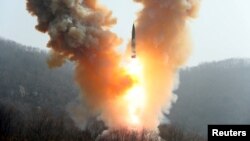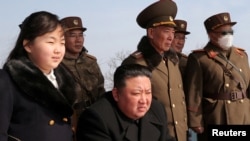A senior United Nations official warned Monday that the situation on the Korean Peninsula is heading in the "wrong direction" days after North Korea fired its second intermediate-range ballistic missile of the year, followed by a short-range ballistic missile on Sunday.
"Tensions continue to increase, with no off-ramps in sight," Miroslav Jenca, U.N. assistant secretary-general for Europe, Central Asia and the Americas, told the Security Council.
He noted that North Korea has "clearly stated its intention" to continue pursuing nuclear and ballistic weapons programs, which are a violation of several Security Council resolutions.
But as Pyongyang continues to flout the international community's demands that it abandon its unlawful nuclear and ballistic missile programs in a complete, verifiable and irreversible manner, the 15-nation council remains divided over what to do.
Since 2006, the council has adopted several sanctions resolutions intended to limit North Korea's access to funds and materials for its illicit weapons programs. But for more than a year, council members have been unable to speak in a unified voice condemning the 10 intercontinental ballistic missile (ICBM) launches and dozens of shorter-range ballistic missile launches.
"The secretary-general [Antonio Guterres] remains deeply concerned over the divisions that have prevented the international community from acting on this matter, as well as on other threats to peace and security around the world," Jenca said of the council's paralysis. "The Korean Peninsula must be an area for cooperation."
The United States and its partners have sought action without success. In May, China and Russia used their vetoes to block a U.S.-drafted resolution that would have imposed new sanctions on Pyongyang. On Monday, Ambassador Linda Thomas-Greenfield said Washington is pursuing what is known as a presidential statement in the council.
"I know two members of this council believe we should stay silent," she said, alluding to Russia and China. "But council silence is not working. Hoping the DPRK regime will stop of its own accord is not working. Month after month, these two members are demanding we do the same thing and expecting different results."
The DPRK is the abbreviation for North Korea's official name, the Democratic People's Republic of Korea.
A presidential statement would require consensus of all 15 council members, which appeared unlikely.
"China has expressed reservations on a council resolution or PRST [presidential statement] precisely because we don't think it is constructive. And on the contrary, we are afraid that they will inject fresh elements of irritants in the situation," said Chinese Deputy Ambassador Geng Shuang.
He urged the U.S. and North Korea to be restrained, demonstrate mutual goodwill and seek a solution in a "calm, cool-headed" manner, adding that Washington should offer practical proposals.
"I don't know what will come out of this PRST yet," Russian Ambassador Vassily Nebenzia said in response to a reporter's question. "I think we should demonstrate restraint in this issue. While accusing DPRK in all the misdeeds that they are doing, the U.S. and their allies forget that they make actions which DPRK considers extremely hostile."
The United States and South Korea are currently conducting 11-day-long joint military exercises in the region.
Japan, which currently sits on the council, took a firm position, as the latest ICBM launch landed 200 kilometers from its territory.
"Where do we stand, on the side of the rule breaker or on the side of the rule keeper? We know the correct answer. Let's do our job," Deputy Japanese Ambassador Shino Mitsuko told council members, expressing support for the presidential statement as an interim measure until the council is ready to take more robust action.
South Korea, which is not on the Security Council but is invited to public meetings on the issue, accused the council of turning a "blind eye" to North Korea's repeated and "brazen" violations.
Ambassador Hwang Joon-kook said his country lives with Pyongyang's missile provocations on a near-daily basis. He took issue with comments from the Russian and Chinese envoys that sought in part to blame the joint military exercises for the missile launches.
"Pyongyang has conducted six nuclear tests and launched more than 200 ballistic missiles over the last several decades — according to their own plan, regardless of our military exercises or our policy toward DPRK — even during the period of our so-called sunshine policy," he said. "This is largely because the DPRK is obsessed with the advancement of its nuclear capabilities to sustain its very, very unique regime, despite the severe and ongoing suffering of its own people."
Following the meeting, the United States was joined by council members Albania, Ecuador, France, Japan, Malta, Switzerland, the United Arab Emirates, the United Kingdom plus South Korea in a statement condemning the recent launches.
"We cannot accept these launches as business as usual. This growing crisis threatens not only the region but global peace and stability," Thomas-Greenfield said on the group's behalf.
She said they remain committed to diplomacy and urged the Security Council to break its silence.
"The DPRK is testing the council's resolve and purpose, and the council must act," the envoy said.





